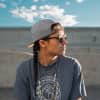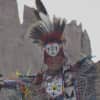Sicangu Lakota hip-hop artist Frank Waln was born and raised on the Rosebud Reservation in South Dakota, where his experiences growing up would eventually inform his work. As both a rapper and an activist, Frank campaigns on issues including indigenous visibility, climate change, and environmental racism. Last year, he joined the cast of MTV's Rebel Music: Native America, one segment of a recurring program highlighting the stories of artists who wield the power of their work for a greater good.
When The FADER called Frank last week, he was parked on the side of the road in North Dakota, on his way to the White Earth Indian Reservation in Minnesota, where he was due to perform at a banquet for people recovering from alcohol addiction and substance abuse. You can catch him on Rebel Music, whose second season is back on the air this month.
How did you got into music? I produce, write, record, and mix all my music. I have a degree as an audio engineer that I recently finished in 2014 at Columbia College in Chicago. I've been doing music professionally for the past six years, recording and doing shows and workshops. Before that, I was pre-med. I thought I wanted to be a doctor, but then I decided to follow my passion. Since I graduated in May, a lot of different, awesome opportunities have come up for me to follow music for a career.
Why did you decide to abandon medicine? I studied it for two years, and after three years, I hit a rock bottom in general. I was at my lowest point for a lot of reasons. There was stuff going on in my personal life, and I got to my lowest point. And I was just like "Okay, I'm going to do what makes me happy, screw what anyone says." It took me getting to that rock bottom to decide to do what makes me happy and to follow my passion.
How do you incorporate your activism into your work? I do it by writing songs about my life and my lived experience. Whether I want to accept it or not, my story is shaped by the reality of colonization and genocide, of that history and that story. So I just make music about my life.
What have the reactions been like since you appeared on Rebel Music? It's been a mixed bag. It's either people really love me or they really hate me. If i'm pissing off ignorant people, shaking their reality and what think they know about native people, which is often not a lot, then I must be doing something right. It's always either extreme love or extreme hate.
There's not much balance in that. The balance for me is that the people who love me and the people who know me and my home community, they feel like I'm doing something right. The extreme hate and extreme love, it's a distraction to me. Everything that matters is the music and the message. If the people who have chosen me to represent them tell me I've done something wrong, I'll listen.
What has your community's feedback been like? It's been for the most part positive. In my lifetime, it's the first time—well, no, it's one of the few times I've seen young indigenous people and this reality of our lives portrayed in a real way. It doesn't really fit the stereotypical image; it doesn't look like a dead people of the past. This country is the result of genocide and this is our story. This is colonized land and every one here is a settler, so they should know our history and their own history. But [my community] treats me with love and admiration. Everyone says that they're so proud of me, so I'm staying connected. I'm trying to give this country the spiritual spanking it deserves.
As you said, we're all settlers. But some people, like African-Americans for instance, did not choose to come here. What kind of relationships do you want to see between indigenous and black communities? I'm figuring that out myself and I'm learning. In South Dakota, it's only white people and Indians. But living in Chicago, I've had to interact with the black community. In my family, there are black Indians, and I've learned a lot from my relatives who are black Indians. I kind of see that relationship as one where we should show solidarity and expect nothing in return. As native people, we shouldn't get caught up in the oppression Olympics, of wondering why black people get this or they don't get that. I think it's possible to support each other. We came out of genocide and black people came out of slavery and genocide in some cases. So really our liberations are connected. I'm listening and learning and providing whatever support the community asks of me.
What do you hope to accomplish with your work? I just want to see a day when me and my family and everyone I love and all indigenous people are happy and healthy, and respected and loved. And also that we realize for ourselves that we deserve that. It took me a while to realize that. Me, I was born on one of the poorest reservations in the country and so I have all this colonial baggage. I only recently started working through that, and music is part of how I do that. I do want to see that day.
Image credit: Matika Wilbur

